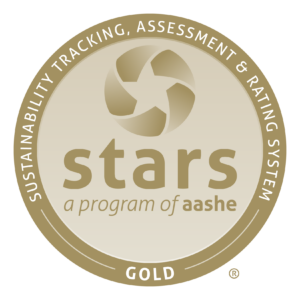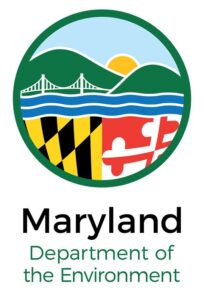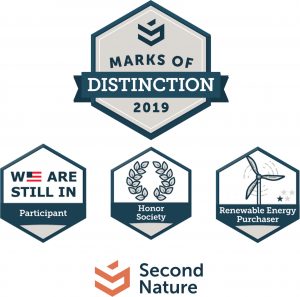The Office of Sustainability coordinates with campus stakeholders to participate and publish reports related to sustainability progress on campus. These various reports mark UMBC’s successes and outline where the university needs to increase efforts. The campus provides transparency and diligent data accuracy while streamlining the reporting to focus on the most material and measurable aspects of our work.
External Reporting
UMBC participates in the Association for the Advancement of Higher Education Sustainability (AASHE) sustainability tracking, assessment, and rating system (STARS) report. In 2025, UMBC earned a Gold rating. STARS is a transparent, self-reporting framework for colleges and universities to measure their sustainability performance. The STARS report is valid for three years and the data collected in the report is linked to the US News and World Report Green Colleges Rankings and the Sierra Cool Schools list. The triennial STARS report is conducted by the Office of Sustainability with the support of over 20 different campus stakeholders. Our comprehensive STARS report is publicly accessible here!
Each year, we report on our solid waste and recycling efforts to the state of Maryland to determine our average diversion rate. Per the Maryland Recycling Act, we must achieve at least 15% diversion. In 2024, we achieved a 20% diversion rate.
The President’s Climate Leadership Commitment, signed in 2007, integrates carbon neutrality with climate resilience and provides a systems approach to mitigating and adapting to a changing climate. Under this commitment, UMBC is required to maintain and update a Climate Action Plan and to annually report the university’s greenhouse gas (GHGs) emissions to the reporting platform. This annual reporting effort is conducted by The Office of Sustainability and Facilities Management in collaboration with the Climate Action Steering Committee.
Internal Reporting
Annual Sustainability Survey
Each year, the Office of Sustainability conducts a sustainability survey of the campus. The survey includes 2 parts, a sustainability literacy assessment (for students) and a sustainability culture survey (for students, faculty, and staff). The sustainability literacy assessment is helpful for us to look at knowledge of sustainability over time and the culture survey gives us ideas on what our office should focus on for the coming academic year. The survey goes out at the beginning of the fall semester.
2024 Sustainability Survey Report
2023 Sustainability Survey Report
Greenhouse Gas Reporting
Each year, UMBC measures the greenhouse gas emissions associated with the operation of our campus to better understand our direct contribution to the heat-trapping gases in the atmosphere – the gases contributing to global climate change. This basis informs our carbon reduction strategies and allows for tracking progress over time.
In 2020, UMBC continued to advance toward and surpass its goal of 25% reduction in emissions by 2025 and net zero emissions by 2050. Overall net emissions are now 44% below UMBC’s 2007 baseline. This reduction was driven in part by gains in building-level energy efficiency investments, operational efficiency of the Central Plant, improvements in the Maryland regional electricity grid, purchase of Renewable Energy Credits, and a temporary de-densification of campus due to COVID-19.
Explore UMBC’s GHG Inventory in detail in addition to all our sustainability data with the link below:


